Composer Krzysztof Penderecki
In Conversation with Bruce Duffie
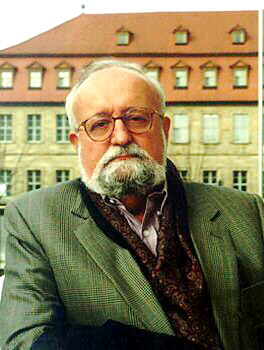
Composer Krzysztof Penderecki
In Conversation with Bruce Duffie

Having spent my life in Chicago, it's been great to experience many world premieres by our world-famous orchestra and opera company. The instrumental pieces come more frequently, so the operas are that much more special for their rarity. The U.S. Bicentennial of 1976 brought forth a number of new works in various parts of the country, practially all of them by American composers. Lyric Opera of Chicago, however, chose to ask the Polish composer Krzysztof Penderecki to create something for us. Though controvertial in some quarters, Paradise Lost turned out to be a significant production both here in the Windy City, and in Italy when it was produced at La Scala. There were panel discussions with the composer and the production team, and much of the public turned out for the spectacle despite it's being a couple years late.
In March of 2000, the composer was back in Chicago to conduct
performances
of his Seven Gates of Jerusalem which introduced some new
percussion
instruments. I had the chance to speak with him at that time and
he was full of bounce and good humor about everything. His
accented-English
was quite good, and he sprinkled many delightful turns of phrase into
his
ideas, some of which I've been able to leave in this text. We
spoke
about both his vocal and instrumental works, and here is what was said
that afternoon . . . . .
Bruce Duffie: First, tell me the joys and sorrows of writing for the human voice.
Krzysztof Penderecki: I am writing all my life for human voice. I began when I was a student. My first piece for the voice was written in 1957, The Psalm of David, and then the Strophen for soprano was written in maybe ’58. Since that time, as you may probably know, I wrote so much for voice.
BD: What is it about the voice that intrigues you?
KP: I think it’s the most beautiful instrument ever created, the human voice. Since I’m writing for voice almost fifty years, I can always find something which interests me in the voice, so it’s no limit writing for voice, I think.
BD: Does the use of texts alter then the way that the musical line will be drawn?
KP: No. Of course, I’m writing different pieces, not always sacred music, and in different languages too. I’m using a lot of Latin and Czech and German. Of my four operas, three are in German, one is in English, and now I’m going to write probably an opera in Spanish. It’s always different because of the different languages.
BD: Is it up to you, though, to make sure that the text language is conveyed in the musical language.
KP: Oh, yes. And I think writing in the specific language, the piece is different. My music in Czech sounds different, of course, than the pieces written in Latin.
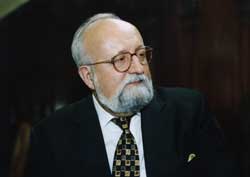 BD:
Do you get inspiration from the texts for how the music will be sung?
BD:
Do you get inspiration from the texts for how the music will be sung?
KP: From the text, but sometimes also from the sound of the language, yes. Both, I would say.
BD: I assume, though, that you never have that kind of inspiration when you’re writing a symphony or a string quartet.
KP: I think it’s absolutely different. Writing for instruments, music is more abstract, I would say. I’m looking for some sounds of the instruments, to find the different new sounds. In the Seven Gates of Jerusalem, I invented a new instrument, the tubaphones. They’re pipes, long, plastic pipes. I wanted to have a deep percussion tuned instrument, and it doesn’t exist, so I had to invent the new instrument.
BD: Were you inventing a new instrument to get a new sound, or were you inventing a new instrument to reproduce the sound you had heard in your ear?
KP: Yes, yes. I’m imagining a sound which I cannot produce because there is no such instrument, so then I am looking for the new instrument.
BD: Did you create that sound in your mind, or did you discover the sound floating in the cosmos?
KP: [Laughter.] No. In this case, I had the music from Australia or New Zealand. The folk music, with the musician using the long bamboo. But this was not enough sounds, not perfect sound which I wanted, so I tried to do it with other instruments, through other material, like plastic, which sounds better, I think.
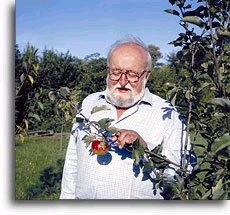 BD:
It sounds better than the bamboo?
BD:
It sounds better than the bamboo?
KP: Oh, yes. Yes, absolutely. Yes.
BD: Are you looking for a “perfect” sound, or a perfect reproduction of the sound?
KP: I don’t know what is perfect. You never can achieve perfect sound.
BD: Are you basically pleased, though, with the sounds you hear coming back at you?
KP: You know, the problem for all composers, not only for me, is that we have to use instruments which were built 300 years ago, or 200 years ago. The newest instrument in the orchestra, maybe, is the saxophone, but it’s over 100 years old now. In the century of the great discovery, landing on the moon and so on, we still have to write for very old instruments, museum instruments really. I think this is the problem. It became really the problem in the second half of the twentieth century, that there is not much progress because of the lack of the instruments.
BD: Would your music be completely different if you had different instruments to write for?
KP: Oh, absolutely. If there would be new instruments, there would be new possibilities, new sound, new combinations, new orchestration and so forth. I think that in our century now, the people must develop new instruments.
BD: You feel, then, restricted by using these old
instruments?
KP: Almost everything has been done for those
instruments.
What can you do? What can you expect now after what we have done
in the fifties and sixties with all the old instruments? Our
experimenting
with strings, using also some elements of electronics but not with
electronic
instruments, trying to transcribe the sound, which I heard in a studio
and adapted for the instruments in Threnody to the Victims of
Hiroshima.
It doesn’t sound like a string orchestra, but it is a string
orchestra.
But how long can you do it? If you go one step farther, you will
destroy the instrument, of course. I almost did.
[Laughter.]
I remember in the sixties many orchestras went on strike and refused to
play my music because I developed new techniques, asking them to
scratch
and to use their instruments like percussion instruments. So
there
was revolution at that time.
BD: But you seem to have moved away from that...
KP: ...because I have done everything that was possible for the instrument, and now I think I am looking for the new instrument rather than to try to write for the old instrument something which is really not the nature of the instrument.
BD: So you need to create a new form of playing along with the new music?
KP: Oh, yes. But, you know, we need the engineers that will develop the new instruments. The composer can have only some ideas.
BD: Are you’re soliciting people to bring you new instruments so you can work with the sounds they make?
KP: I think so, yes. I’m always looking. In almost each piece I’m trying to use the new instruments. Sometimes they are not new instruments, but they’re not used for the symphonic music, like ocarinas. In two compositions, I used twelve ocarinas. They have an interesting sound.
BD: Yes, it’s sort of a hollow kind of sound.
KP: Yes, yes.
BD: Do we have ocarina virtuosi that you can call on?
KP: No. I was using a kind of jazz for the sound, like the cluster of ocarinas, not a special thing.
BD: Can we look forward to an Ocarina Concerto from you?
KP: No, no, no. [Laughter.]
BD: Do you really feel that you and all the other composers have played out the possibilities of the old instruments?
KP: I can only talk about myself, of course. What I see now and for about thirty years, nothing has moved in the avant-garde. We pushed music so far in the sixties that even for myself, for me, I closed the door behind me, because there was no way to do anything more than I have done. The pieces like Polymorphia, like Fluorescences, like Threnody, and since that time, nobody did music which is more progressive. Nobody wrote something fresh and new for the strings.
BD: Have you’ve backed off of that and gone off in another direction?
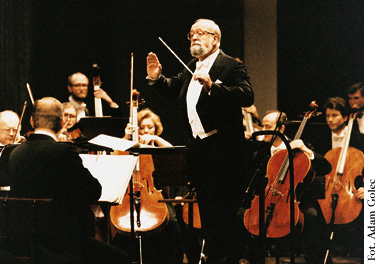 KP:
I think there is the period which I finished. I wrote several
pieces
in the late fifties and the beginning of the sixties when I decided
that
there is no way that I can move on. I was not interested to
repeat
myself. Of course, I could write a hundred threnodies, and I
didn’t
want to. This is like the sample, the piece which gave the
possibility
for the other. Of course, many composers were trying to do the
same,
but as I said before, there is a certain limitation you cannot go over.
KP:
I think there is the period which I finished. I wrote several
pieces
in the late fifties and the beginning of the sixties when I decided
that
there is no way that I can move on. I was not interested to
repeat
myself. Of course, I could write a hundred threnodies, and I
didn’t
want to. This is like the sample, the piece which gave the
possibility
for the other. Of course, many composers were trying to do the
same,
but as I said before, there is a certain limitation you cannot go over.
BD: Are you pleased, though, when these pieces are still performed twenty and thirty years later?
KP: Oh, yes, of course. I am conducting these pieces. But after more than forty years, it’s still very difficult music for the musician.
BD: Does it please you that they can cope with it much better now than they did before? Or am I assuming too much?
KP: No, no, I don’t think so. Orchestra musicians don’t like to do something which they didn’t learn in the school, and if you bring something completely new, there is always problem. I not only developed new techniques for the strings, but also I developed new notation, and this was maybe too much.
BD: Are you encouraging these new techniques be taught in the schools?
KP: Of course. In eastern Europe, every musician starting violin knows this technique because they were studying my music.
* * * * *
BD: When you’re sitting down writing a new piece of music, whom do you have in mind? Do you have the audience in mind? Do you have the performers in mind, yourself in mind? Who is in your mind?
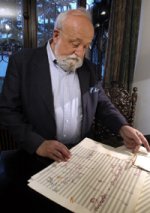 KP:
I would say I am writing for myself first. But of course I have
in
mind the musicians that are going to play my music. Yes, the
audience,
of course, but I’m not writing very easy music, so I am not writing for
everybody. If I have in mind the audience, it’s a very good
audience
who is going to understand the classical styles. And then I think
there is no problem for such people who go every week to the concert to
understand my music, because I think my music is just a continuation,
with
some small revolution, especially in the beginning.
KP:
I would say I am writing for myself first. But of course I have
in
mind the musicians that are going to play my music. Yes, the
audience,
of course, but I’m not writing very easy music, so I am not writing for
everybody. If I have in mind the audience, it’s a very good
audience
who is going to understand the classical styles. And then I think
there is no problem for such people who go every week to the concert to
understand my music, because I think my music is just a continuation,
with
some small revolution, especially in the beginning.
BD: Do you still consider yourself a revolutionary?
KP: Yes, but I don’t believe in permanent revolution like Trotsky wanted to have [Laughter.] You know what happened to him and to all the revolution. After the revolution, the counter-revolution is coming.
BD: Are you part of your own counter-revolution, or are you trying to hold on to something?
KP: Sometimes, searching for something different, I have to write against myself as well. I’m moving in a different direction. It has to be different. There has to be against.
BD: Is there ever a time when you don’t come up with the ideas that you want?
KP: Every day. [Laughter.] Every day, writing something, I have to fight with myself, because I’m always looking for something new. I don’t like to repeat myself. I want always to find something which is fresh.
BD. Is it something completely new, or is it an outgrowth of what you've been doing?
KP: There is no way to do something completely new. I did once. My early pieces were really different and new, completely new, even different from the avant-garde, the so-called western avant-garde. I’m talking about the fifties and sixties.
BD: We keep talking about the fifties and sixties, but obviously you kept writing in the seventies and eighties and nineties. Tell me a little bit about the music as it evolved toward the end of the century.
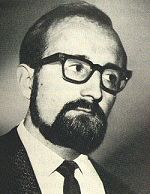 KP:
Of course my music has changed, but this did not happen from one day to
another or one week to another. It was a longer process.
After
I finished the pieces in ’62, I wrote Fluorescences, a decadent
piece for the orchestra, destroying really the classical orchestra, and
then it was clear for me there is no way to continue. I had to go
to find other ways to write music, so I wrote Stabat Mater,
which
goes back to the sixteenth-century polyphony, combined, of course, with
all my experience in the studio and experience with the human
voice.
Then I wrote several pieces, like the St. Luke Passion.
If
I would write only pieces like Threnody, I wouldn’t be able to
write
the St. Luke Passion, which is a longer piece. The early
experimental
pieces were short. They were seven, eight minutes, like the
string
quartets, like the older pieces for strings. They were very short
pieces. So I was dreaming to write the big oratorio. I
wanted
to do that very much, but I knew that with this kind of technique, I
would
never be able to write a longer piece, or an important piece. I
was
studying the sixteenth-century counterpoint, because I once did it in
school,
and I found a way to write different music. This was the first
time
that I really changed my style, having all this experience. In
the
St. Luke Passion you can find everything which I have done in
the
early sixties and late fifties. Then after finishing a couple of
pieces like Utrenja, again, it was not enough for me. I
wanted
to experiment with the tradition. So I rediscovered the
post-Romanticism,
especially Bruckner, and I wrote several pieces under that
influence.
One of the pieces which I wrote in the middle of seventies was Paradise
Lost for the Chicago Lyric Opera. Also the Second Symphony
and the First Violin Concerto. All those pieces were
written
in a very short time, between ’74, ’75 and ’82, maybe. And it’s
very
clear that I’m trying to continue this tradition, this Romantic
tradition.
It’s not only me. If you look at twentieth-century symphonic
music,
Shostakovich, for example, is doing the same. He was continuing
Mahler,
really. My music, I think, goes more in that direction than the
direction
of Bruckner, I would say. There’s maybe not much from Bruckner in
my music, but this was the concept of the symphony which inspired me
very
much, but also as well as Shostakovich. I am not a
musicologist.
I am not analyzing my own music, but there is the question everybody is
asking me: “Why did you change? Why didn’t you continue the same
music which was written in the fifties and sixties?” I am always
saying: “Because I said everything in this idiom. I didn’t want
to
be my own epigone.”
KP:
Of course my music has changed, but this did not happen from one day to
another or one week to another. It was a longer process.
After
I finished the pieces in ’62, I wrote Fluorescences, a decadent
piece for the orchestra, destroying really the classical orchestra, and
then it was clear for me there is no way to continue. I had to go
to find other ways to write music, so I wrote Stabat Mater,
which
goes back to the sixteenth-century polyphony, combined, of course, with
all my experience in the studio and experience with the human
voice.
Then I wrote several pieces, like the St. Luke Passion.
If
I would write only pieces like Threnody, I wouldn’t be able to
write
the St. Luke Passion, which is a longer piece. The early
experimental
pieces were short. They were seven, eight minutes, like the
string
quartets, like the older pieces for strings. They were very short
pieces. So I was dreaming to write the big oratorio. I
wanted
to do that very much, but I knew that with this kind of technique, I
would
never be able to write a longer piece, or an important piece. I
was
studying the sixteenth-century counterpoint, because I once did it in
school,
and I found a way to write different music. This was the first
time
that I really changed my style, having all this experience. In
the
St. Luke Passion you can find everything which I have done in
the
early sixties and late fifties. Then after finishing a couple of
pieces like Utrenja, again, it was not enough for me. I
wanted
to experiment with the tradition. So I rediscovered the
post-Romanticism,
especially Bruckner, and I wrote several pieces under that
influence.
One of the pieces which I wrote in the middle of seventies was Paradise
Lost for the Chicago Lyric Opera. Also the Second Symphony
and the First Violin Concerto. All those pieces were
written
in a very short time, between ’74, ’75 and ’82, maybe. And it’s
very
clear that I’m trying to continue this tradition, this Romantic
tradition.
It’s not only me. If you look at twentieth-century symphonic
music,
Shostakovich, for example, is doing the same. He was continuing
Mahler,
really. My music, I think, goes more in that direction than the
direction
of Bruckner, I would say. There’s maybe not much from Bruckner in
my music, but this was the concept of the symphony which inspired me
very
much, but also as well as Shostakovich. I am not a
musicologist.
I am not analyzing my own music, but there is the question everybody is
asking me: “Why did you change? Why didn’t you continue the same
music which was written in the fifties and sixties?” I am always
saying: “Because I said everything in this idiom. I didn’t want
to
be my own epigone.”
BD: So now you are still saying what you want to say but in a different idiom?
KP: Yes. And in the last, maybe almost twenty years, I think my music is more or less the synthesis. There are still elements from my early music because this was a very important period for me, this time of discovery. But my music is just different. I think it’s mature. I’m almost writing only the big forms. Even the Second Violin Concerto, is a large piece. It’s a one-movement piece, but it’s forty-minutes. And my symphonies... I think my task is to finish my symphonies, because as far as oratorio is concerned, I think that with Credo I wrote everything. Maybe I will go back someday and continue, maybe write another piece, maybe another passion, but I wrote almost seven oratorios. I think it’s enough for one life. [Laughter.] And I am more and more now interested in chamber music. This last year, I spent writing chamber music. I wrote the sonata for Anne-Sophie Mutter, Sonata for Violin and Piano.
BD: Will there be more string quartets?
KP: Yes, but now I am working on a sextet, not a very typical sextet. It’s for violin, viola, cello, piano, clarinet and French horn.
BD: Ah! Interesting mixture.
KP: Yes, I think so. It’s commissioned by the Musikverein, Vienna, and it will be performed in June.
BD: I assume you get many, many more commissions than you can handle. How do you decide yes or no?
KP: I am taking more commissions than I really am able to write, but this keeps me in form, writing every day. I must have it. I know that it is impossible to finish everything, but I would take the commission. But also, of course, I am deciding what kind of piece I am writing. I wouldn’t write a piece because of somebody asking me for some strange combination, no. I’m writing myself, and I will continue I will finish my ninth symphony, and then I will decide if I’m going beyond nine or not.
BD: [Laughter.] So it will be your decision?
KP: Yes. Maybe not.
* * * * *
BD: Let me ask a very easy question. What’s the purpose of music?
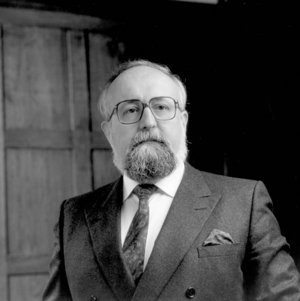 KP:
For me, it’s just communication with people, because it’s the only way
I can communicate easily. This is my profession. I am
writing
music since I was six or seven. I do not want to say that I
wanted
to find the audience because in the beginning, I wanted to write
against
the audience, even, in my early pieces. But those pieces written
in the sixties were played, and I found an audience, and I found the
people
that were interested in this music, so I think it’s very important
writing
music which somebody understands.
KP:
For me, it’s just communication with people, because it’s the only way
I can communicate easily. This is my profession. I am
writing
music since I was six or seven. I do not want to say that I
wanted
to find the audience because in the beginning, I wanted to write
against
the audience, even, in my early pieces. But those pieces written
in the sixties were played, and I found an audience, and I found the
people
that were interested in this music, so I think it’s very important
writing
music which somebody understands.
BD: Even though you were using new language and forced them to learn your new language?
KP: Yes, but I think the audience is very open, usually, the good audience. I can always... [short pause] surprise the audience.
BD: Is that very important, to surprise us each time?
KP: Yes, because I don’t like that somebody will say that I am a composer who is just writing the same pieces in the same musical language. I think it must be very boring to write the same thing for the whole life. There are some artists who are doing this, just like some painters. Chagall is a great painter, but all that he was doing was not much different, you know. In his painting, from the very beginning almost to the end, there is, of course, evolution, but he was never revolutionary like Picasso. Picasso interests me much more because he was always looking for something different, sometimes going back, having an affair with Velasquez, but it was always Picasso.
BD: So you don’t find it as satisfying to explore more deeply the older form or what you have done before?
KP: There are several periods in my music. You can see that after I would write four or five pieces, they are always better and better. But then I’m going another way because I get bored to write the same thing.
BD: And you don’t want the audience to be bored?
KP: No, no. I have to satisfy myself first, not the audience.
BD: Does your music always satisfy you?
KP: Yes. I wrote a lot, but I’m writing slow, very slow, and even slower now. But I’m writing every day, all my life. I am sixty-six now, and sixty years I’m writing music.
BD: Every day?
KP: Every day, yes. Even when I’m traveling, I am writing.
BD: Are you ever surprised at what you see going down on the page?
KP: No, because I imagine music before I am writing.
BD: Then are you really just transcribing it?
 KP:
Yes, yes. I wouldn’t just see it in the empty piece of paper and
try to put some notes together or chords together. No, no,
no.
I have the clear concept. As a matter of fact, because I am
writing
every day, there is always continuation of something I did before.
KP:
Yes, yes. I wouldn’t just see it in the empty piece of paper and
try to put some notes together or chords together. No, no,
no.
I have the clear concept. As a matter of fact, because I am
writing
every day, there is always continuation of something I did before.
BD: In each piece, or from piece to piece also?
KP: Also from piece to piece, of course, yes.
BD: Are each of these pieces exploring different aspects of you?
KP: That, I don’t know. I’m always fascinated by form first. What concerns me is really not writing, because I can write. After so many years, there is no problem. But I need to find the form and to find the shape of the piece. I am never writing from the beginning to the end. I am always starting in at some point, making a lot of sketches which are graphical, not always with the music, with the notes, no. And after I have a very clear concept of the form, then I am really starting to write, but even then, never from the beginning to the end but always from the middle. And then I am going to the left and right, both sides.
BD: Like throwing a stone in the water and watching the ripples go out?
KP: Yes, yes. I am always building the form from the heart.
BD: From the heart, radiating out.
KP Yes.
BD: When you’re working on it and you’re tinkering and you’re getting everything right, and you’re putting things down, how do you know when you’ve finished?
KP: There is something like instinct, I think, that a composer, the artist, must have. It's important to know exactly, because there are thousands or hundred of thousands of possibilities. You have to find the right solution and to know exactly where to finish the piece.
BD: Is your solution always the right one?
KP: If not, I wouldn’t give out my piece. Of course not. I would keep the piece then. Some pieces I still have unfinished, or maybe some ideas, and sometimes I am using the fragments of them, of my thoughts, in another piece. But I think I have always more ideas than I need, so I am not using all the ideas in one piece.
BD: So part of your task, then, is selecting which ideas go in which piece?
KP: I think the process of composition, of writing music, is like crystallization of something, from the very small idea, very simple, to very complicated, from the nucleus of the motif to the bigger form.
* * * * *
BD: Many times you conduct your own pieces, and other times someone else conducts them. Are you the better conductor of your works?
KP: No, no. If somebody is conducting, a good conductor, good musician, could discover something which I was not aware, even, in my music.
BD: Do you relish that?
KP: Yes, yes. Some good musicians were doing my music and I can learn from them, too.
BD: Do you then incorporate that into your own interpretation when you perform it subsequently?
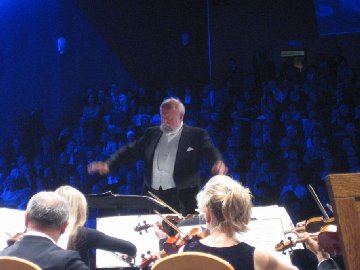
KP: Yes, absolutely. I don’t like to do the first performance myself. I would rather give it to another conductor who is doing it. I can really then have a distance from my own piece.
BD: Then you come it to later?
KP: Yes. Because I wrote the piece, I know the piece, but maybe my concept is only one of the interpretations. Maybe it’s not good, because there are many, many possibilities to conduct a piece, the same piece.
BD: If you come back to your own score a number of years later, do you look for more of these possibilities?
KP: There is something that I think happens, not just to me, but also to many, many others. My imagination is much richer than I am really able to write. When I am tired, sometimes I am dreaming about the very particular piece I'm working on, and I wake up with some fresh ideas, and I am not able really to write everything down. Just some percentage of it. So conducting my own piece is going back to something which has been lost, something which you can’t really describe the color, especially the color of the orchestra, because the form is fixed. But there are many ways to conduct the same piece as far as the tempo is concerned.
BD: And they’re all right?
KP: Yes. It depends on the place. If I would do my piece in a church, the tempi are different than in a very dry acoustic. And the mood, also, yes.
BD: The mood at the time you wrote it, or the mood you are in at that performance?
KP: My mood in the moment I am conducting.
* * * * *
BD: You mentioned that you are sixty-six. Are you pleased with where you are at this point in your career?
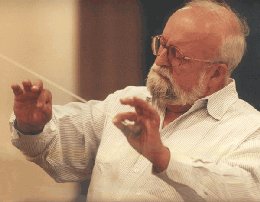 KP:
No, I think the whole life of the artist is always in progress, and I
am
never satisfied. Always I think in the beginning that I can maybe
do better and different, especially different, but better too, of
course.
KP:
No, I think the whole life of the artist is always in progress, and I
am
never satisfied. Always I think in the beginning that I can maybe
do better and different, especially different, but better too, of
course.
BD: Always growing?
KP: Yes.
BD: Thank you for coming back to Chicago.
KP: Thank you. Thank you very much.
| (The following brief biography is from the Polish Music Center of USC) Krzysztof Penderecki was born in Debica on 23 November, 1933. He studied composition privately with Franciszek Skolyszewski and then (1955-8) with Artur Malawski and Stanislaw Wiechowicz at the State Higher School of Music in Kraków, where he also taught, being appointed its rector (i.e., president) in 1972 (in the 1980s the School was renamed "Academy of Music"). Penderecki's career had a very auspicious beginning. In 1959 he came suddenly to prominence when three of his works won first prizes in a national competition organized by the Polish Composers' Union (he submitted them under different pseudonyms). His reputation quickly spread abroad, notably through perfomances of such works as Anaklasis (written for the 1960 Donaueschigen Festival) and Threnody for the Victims of Hiroshima. The latter piece, as well as the Passion according to St. Luke of 1963-5, found an unusually wide audience for contemporary works, and Penderecki soon received important commissions from diverse organizations in Europe and the USA. He has also appeared widely as a lecturer and in 1972 began to conduct his own compositions. Penderecki has won numerous domestic and foreign prizes including the First Class State Award (1968, 1983), the Polish Composers' Union Prize (1970), the Herder Prize (1977), the Sibelius Prize (1983), the Premio Lorenzo Magnifico (1985), the Israeli Karl Wolff Foundation Prize (1987), a Grammy Award (1988), a Grawemeyer Award (1992), and a UNESCO International Music Council Award (1993). He has honorary doctorates from universities in Rochester, Bordeaux, Leuven, Belgrade, Washington, Madrit, Pozna?, Warsaw and Glasgow. He is an honorary member of the Royal Academy of Music in London, Accademia Nazionale di Santa Cecilia in Rome, Musikaliska Academien in Stockholm, Akademie der Kunste in Berlin, Academia Nacional de Bellas Artes in Buenos Aires, Academie Internationale de Philosophie et de I' Art in Bern, Academie Internationale des Sciences, Belles-lettres et Arts in Bordeaux, and the Royal Academy of Music in Dublin. In 1990 he received the Great Cross of Merit of the Order of Merit of the Federal Republic of Germany, in 1993 the Order of Cultural Merit (Monaco), and in 1994 an Austrian honorary distinction For Achievements in Science and Arts. In 1993 he was decorated with the Commander's Cross with the star of the Order of Polonia Restituta. Penderecki's teaching career developed in Germany, the U.S. and Poland. He taught composition at the Volkwang Hochschule fur Music, Essen (from 1966 to 1968); in 1973-78 he lectured at Yale University in New Haven. In 1982-87 he was rector of the Academy of Music in Kraków, in 1987-1990 he served as the artistic director of the Cracow Philharmonic. Since his conductor's debut with the London Symphony Orchestra (1973), he has performed with prominent symphony orchestras in the United States and Europe, and he is chief guest conductor of the Norddeutscher Rundfunk Orchestra in Hamburg. Apart from his own works, his conducting repertoire covers the works of composers from various epochs, with a preference for 19th-century and early 20th-century compositions. In 1997 he published a book entitled "The Labyrinth of Time. Five Lectures at the End of the Century" (Warsaw, "Presspublica"). In 1996 the performance of his piece Seven Gates of Jerusalem, commissioned by the city, commemorated the celebrations of "Jerusalem - 3000 Years" in Israel. |
=== === === === ===
- - - - - - - - - - - -
=== === === === ===
Winner of the ASCAP/Deems Taylor Broadcast Award in 1991, Bruce
Duffie spent 25 years with WNIB, Classical 97 in
Chicago.
His series of programs featuring music and interviews with composers
and
performers was a popular favorite, and now continues on WNUR-FM,
and on Contemporary Classical Internet Radio. Many of the
interviews have been published in magazines and journals over the
years,
and some are now being posted on this website.
To see a full list (with links) of interviews which have been transcribed and posted on this website, click here.
For more information, visit Bruce
Duffie's Website. He also responds to E-Mail
messages.
He would also
like
to call your attention to the photos and information about his
grandfather, who was a pioneer in the automotive field more than a
century ago.
© 2000 Bruce Duffie
This interview was held in Chicago on March 9, 2000, and portions
were
aired on WNIB a few days later. The unedited audio tape
was
also copied and given to the Oral History American Music Archive at
Yale University, and a transcript was made by them. This
version
was edited by Bruce Duffie and first posted on this website in October
of 2006.